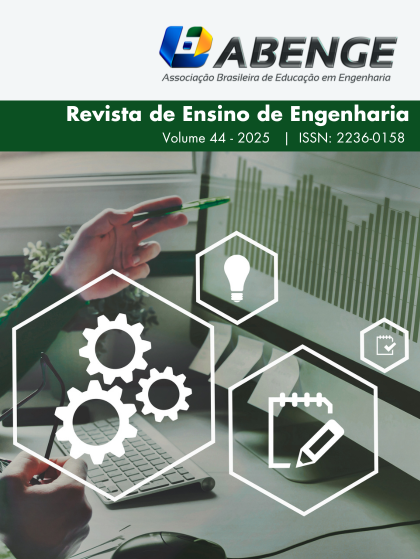RecycActive: electronic waste as a learning tool in the education of electrical engineers
Keywords:
sustainability, electronic recycling, circular economy, practical learning, social impactAbstract
The ReciclAtiva project integrates education, sustainability, and innovation by promoting the reuse of electronic waste in the construction of functional toys. The initiative enabled Electrical Engineering students to develop technical skills by applying electronics and recycling concepts to create prototypes from discarded components. In addition to technical improvements, the project fostered socio-emotional skills such as teamwork, creativity, and leadership. Community engagement, through awareness campaigns and academic exhibitions, strengthened the social impact of the initiative, highlighting the importance of the circular economy. The results demonstrate that projects like ReciclAtiva significantly contribute to academic training and electronic waste reduction, encouraging sustainable practices and societal engagement in environmental preservation. The students' involvement, the impact generated in local communities, and the promotion of sustainability show that, in addition to enhancing the students' education, the project has the power to transform the surrounding reality, fostering a culture of innovation and social responsibility.
References
ALMEIDA, F. J. S.; SANTANA, R. A.; MORAIS, P. R. Reciclagem e inovação tecnológica: ensino sustentável no contexto da engenharia. Revista Brasileira de Educação em Engenharia, v. 9, n. 2, p. 45-58, 2009.
BARRETO, A. P.; FREITAS, R. F. Aprendizagem baseada em projetos: integração entre teoria e prática na formação de engenheiros. Revista de Ensino de Engenharia, v. 39, n. 3, p. 101-114, 2019.
BARDIN, L. Análise de conteúdo. Lisboa: Edições 70, 2011.
BENDER, W. N. Project-Based Learning: Differentiating Instruction for the 21st Century. 2. ed. Thousand Oaks: Corwin Press, 2014.
BRASIL. Ministério da Educação. Conselho Nacional de Educação. Câmara de Educação Superior. Resolução CNE/CES nº 7, de 18 de dezembro de 2018. Estabelece as Diretrizes para a Extensão na Educação Superior Brasileira e regimenta o disposto na Meta 12.7 da Lei nº 13.005/2014, que aprova o Plano Nacional de Educação - PNE 2014-2024 e dá outras providências. Diário Oficial da União, Brasília, DF, 19 dez. 2018.
BRASIL. Ministério da Educação. Conselho Nacional de Educação. Câmara de Educação Superior. Resolução CNE/CES nº 2, de 24 de abril de 2019. Institui as Diretrizes Curriculares Nacionais do Curso de Graduação em Engenharia. Diário Oficial da União, Brasília, DF, Seção 1, p. 43, 26 abr. 2019.
COSTA, T. R.; MARTINS, L. P.; LOPES, F. A. Project-Based Learning in Engineering Education: Integrating Sustainability and Practice. Journal of Engineering Education Research, v. 32, n. 4, p. 215-228, 2023.
CRESWELL, J. W. Research Design: Qualitative, Quantitative and Mixed Methods Approaches. 5. ed. Thousand Oaks: SAGE Publications, 2021.
FARIAS, R. G.; OLIVEIRA, E. L.; SOUZA, V. N. Aprendizagem ativa e formação de engenheiros: experiências em metodologias integradoras. Revista de Ensino de Engenharia, v. 41, n. 2, p. 45-58, 2022.
FERNANDES, P. S.; REIS, C. M. Extensão universitária e sustentabilidade na formação em Engenharia. Revista Brasileira de Educação em Engenharia, v. 40, n. 3, p. 85-97, 2020.
FERREIRA, J. C.; LIMA, E. M.; VIEIRA, A. C. Projeto integrador em Engenharia Elétrica: práticas sustentáveis e ensino aplicado. Cadernos de Educação Tecnológica, v. 14, n. 1, p. 75-88, 2020.
GOMES, D. L.; LIMA, P. S.; RIBEIRO, M. C. Engenharia e compromisso social: práticas extensionistas e impacto comunitário. Education for Sustainability Review, v. 7, n. 1, p. 44-56, 2023.
KAJIKAWA, Y. Research core and framework of sustainability science. Sustainability Science, v. 7, p. 1-6, 2012.
MENDONÇA, R. T.; LIMA, A. C.; BARBOSA, D. H. Electrical Engineering Education and Environmental Awareness: a Project-Based Approach. IEEE Transactions on Education, v. 67, n. 2, p. 98-107, 2024.
NAGEL, R.; PAPPAS, E.; PIERRAKOS, O. On a vision to educating students in sustainability and design: the James Madison University School of Engineering approach. Sustainability, v. 3, n. 1, p. 94-107, 2011.
OLIVEIRA, J. S.; SOARES, A. M.; LOPES, C. N. Reutilização de REEE e economia circular: desafios para o ensino de Engenharia. Revista de Sustentabilidade e Tecnologia, v. 14, n. 1, p. 123-139, 2023.
SANTOS, F. A.; PEREIRA, V. L. Aprendizagem por projetos aplicada à eletrônica básica. Anais... COBENGE, p. 132–140, 2021.
SILVA, R.; CUNHA, M. E. Gestão de resíduos eletroeletrônicos no Brasil: avanços e desafios. Sustainability in Practice Journal, v. 12, n. 3, p. 55-70, 2022.
UNITAR. Global E-Waste Monitor 2024. Geneva: United Nations Institute for Training and Research, 2024.
WEILER, R. A.; COSTA, D. P.; SANTANA, C. F. Educação ambiental e engenharia: práticas sustentáveis no ensino de eletrônica. Revista de Ensino de Engenharia, v. 31, n. 1, p. 22-35, 2013.


